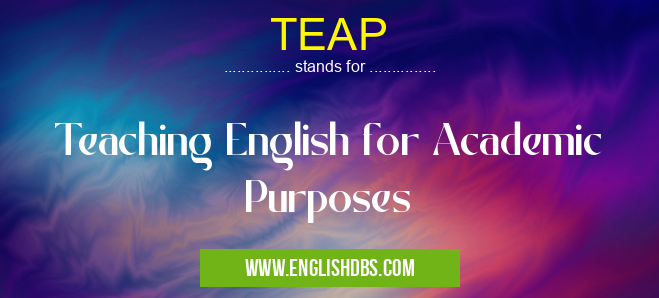What does TEAP mean in ENGLISH
TEAP stands for Teaching English for Academic Purposes. It is a specialized field of English language teaching that focuses on developing the academic language skills of non-native English speakers. The goal of TEAP is to enable students to succeed in academic settings where English is the medium of instruction.

TEAP meaning in English in International
TEAP mostly used in an acronym English in Category International that means Teaching English for Academic Purposes
Shorthand: TEAP,
Full Form: Teaching English for Academic Purposes
For more information of "Teaching English for Academic Purposes", see the section below.
» International » English
What does TEAP mean?
TEAP involves teaching students the vocabulary, grammar, and discourse conventions necessary for academic success. This includes:
- Reading comprehension: Developing the ability to understand and analyze academic texts
- Writing: Producing coherent and well-organized academic essays, research papers, and other written assignments
- Speaking: Participating in academic discussions, presenting research, and giving presentations
- Listening: Comprehending lectures and other spoken academic material
TEAP Meaning in INTERNATIONAL
TEAP is recognized internationally as a specialized field of English language teaching. It is offered in universities, colleges, and language schools around the world. TEAP programs are tailored to the specific needs of non-native English speakers in various academic disciplines, such as:
- Science and technology
- Social sciences
- Humanities
- Business
Essential Questions and Answers on Teaching English for Academic Purposes in "INTERNATIONAL»ENGLISH"
What is TEAP?
TEAP (Teaching English for Academic Purposes) is a specialized branch of English language teaching tailored to the needs of non-native English speakers who require English proficiency for academic studies, research, and professional communication in higher education settings.
Who benefits from TEAP?
TEAP is designed for individuals who need to develop their English language skills to succeed in academic contexts, such as international students, scholars, researchers, and professionals pursuing higher education or working in English-speaking environments.
What are the key components of TEAP?
TEAP typically focuses on developing students' proficiency in academic reading, writing, listening, and speaking skills, as well as academic vocabulary and discourse conventions. It also incorporates strategies for critical thinking, research, and presenting information effectively.
How does TEAP differ from general English language teaching?
TEAP differs from general English language teaching in that it emphasizes the specific language skills and knowledge required for academic success. It focuses on developing students' ability to comprehend, analyze, and produce complex academic texts, participate in academic discussions, and write research papers and presentations in an appropriate academic style.
Is TEAP certification necessary?
While certification is not always a requirement, it can demonstrate a teacher's specialized knowledge and skills in TEAP. Certification programs typically involve coursework, practical training, and assessment to ensure teachers are equipped to effectively support students in academic English language development.
Final Words: TEAP is an essential field of English language teaching that provides non-native English speakers with the language skills necessary for academic success. By developing their academic language abilities, TEAP helps students overcome linguistic barriers and achieve their full potential in higher education and beyond.
